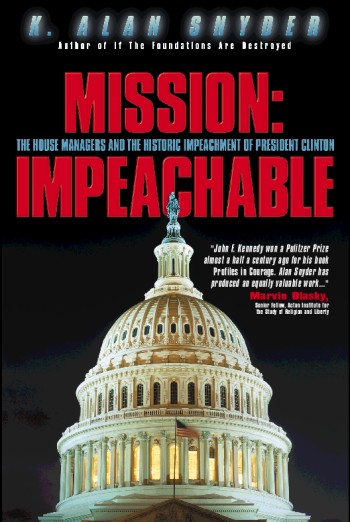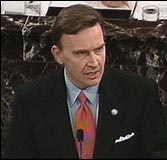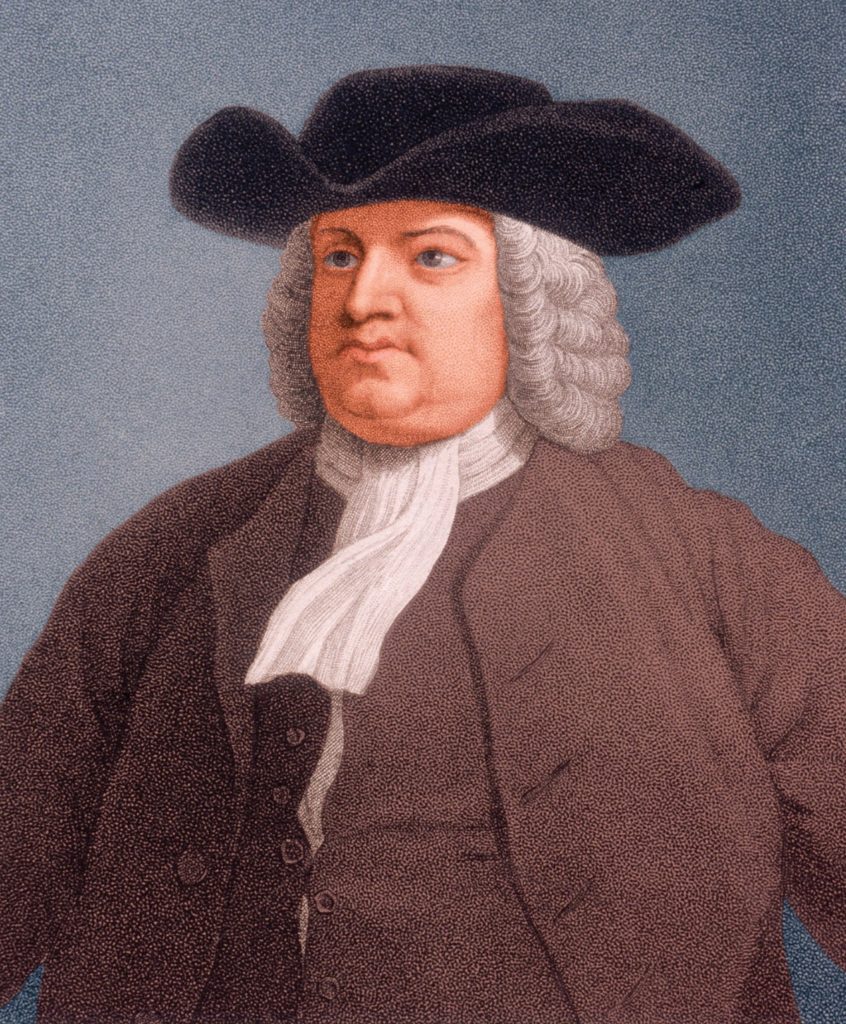Bill Clinton was acquitted of impeachment charges in February 1999. The next month, I was in Washington, DC, attending a conference on constitutional history. It included a session in the chamber of the Supreme Court.

I was thrilled to be there. Years before, while earning my doctorate at American University, I had worked in the Supreme Court history office and had even sat in on one of the cases presented to the Court. The thrill, though, disappeared as I listened to the speaker that day, a respected historian, as he chose to denigrate the courageous congressmen who had voted for Clinton’s impeachment and then had gone to the Senate to make their arguments for his removal from office for the crimes of perjury and obstruction of justice.
What rankled me, in particular, was his emotional accusation that those congressmen—referred to as the House Managers—had been “self-righteous” and “holier than thou.” The words resounded throughout the Supreme Court chamber, the disdain with which they were spoken seemingly at odds with the ambience of this venerable courtroom.

That historian’s verbal attack upon men who believed they were carrying out their duty as dictated by the Constitution led me to interview all thirteen of the congressmen who had undertaken the doomed mission to remove Clinton from office—doomed because it was obvious from the start that no Democrats would respond positively to their arguments for removal. Those interviews resulted in a book that gave them the opportunity to explain why they carried out this task despite the odds against them.
Each interview was as unique as each of the congressmen, and I learned firsthand from every one of them that they had taken this responsibility seriously because of their commitment to the rule of law—no one is above the law, not even the president, they told me.

The one interview that impressed me the most was the one I conducted with James Rogan of California. Rogan’s district included Hollywood, not exactly a safe district for a Republican arguing to dismiss a Democrat president.
Rogan had experienced a rough childhood. He was born out of wedlock and never knew his father. His mother became a drug addict and served time in prison. Sent to live with grandparents, they both died before he turned nine. Shuttled off to a great-aunt, she also died shortly afterward. In spite of this, he made something of himself, earning his law degree. Yet he eventually came to the end of himself, realizing that the spiritual vacuum inside him could only be filled by Christ. He became a devoted Christian and served in Congress in the strength of that faith.
Fellow Republicans told him he didn’t have to vote for impeachment or be part of the Manager team due to his precarious reelection chances, but he refused to take the easy way out. He felt he had to do his duty. In my interview with him, he stated emphatically,
If I had taken a pass on voting to impeach this President who used the power of his job and . . . abused his office by committing perjury ad obstruction of justice and suborning perjury—crimes that were committed merely to protect himself from political embarrassment and political consequences—if I had voted against defense of the Constitution to protect myself from political consequences, then I would have been guilty of the same offense he was.
I had to take my oath of office seriously, even when I didn’t believe the President took his seriously.
When it came his turn to speak to the senators who had the authority to remove Clinton, Rogan stressed that it had always been his dream to serve in Congress but that “the pundits keep telling me that my stand on this issue puts my political fortunes in jeopardy. So be it. That revelation produces from me no flinching.” He continued,
There is a simple reason why: I know that in life dreams come and dreams go. But conscience is forever. I can live with the concept of not serving in Congress. I cannot live with the idea of remaining in Congress at the expense of doing what I believe to be right.
Rogan then concluded his argument with these words: “Always put principle above politics; put honor above incumbency.”
Rogan lost his reelection bid, but he kept his conscience, which, as James Madison once noted, is the most sacred of all property.
We are now in a political season that brings back memories of the Clinton impeachment. Emotions are running high in the wake of Robert Mueller’s completed investigation.

I’ve read key portions of the report and have copied and pasted sections into a document of my own for easy access. As a historian, it’s important for me to be as informed as possible as I continue my teaching and writing. Further, as someone who identifies as a Christian constitutional conservative, I want to be faithful to that calling and come to conclusions based on my faith and how that relates to the rule of law in our constitutional republic.
My initial reading of the report indicates to me that there are serious grounds for a possible impeachment and/or a resignation, the latter following in Nixon’s steps. I see definite instances of intent to obstruct justice. I won’t go into any details today, but I’m concerned about the integrity of the office of the presidency now just as much as I was during the Clinton impeachment process.
My views will put me at odds with many of my friends, and that doesn’t make me glad. In fact, if I could somehow walk away from this and say nothing, there is a part of me that would welcome it. But I know my calling before God; I can’t just walk away and pretend this isn’t important enough to write about.
I have to be like James Rogan and put principle above politics. My sincere hope is that a growing number of Christian conservatives will do the same and not simply “defend the tribe.”

The Quaker founder of Pennsylvania, William Penn, had the right attitude when he said, “It is now above twenty years, I thank God, that I have not been very solicitous what the world thought of me. For since I have had the knowledge of religion from a principle in myself, the first and main point with me has been, to approve myself in the sight of God, through patience and well-doing, so that the world has not had weight enough with me to suffer its good opinion to raise me, or its ill opinion to deject me.”
I want to have that same attitude and keep in mind that I must always put principle above politics.
